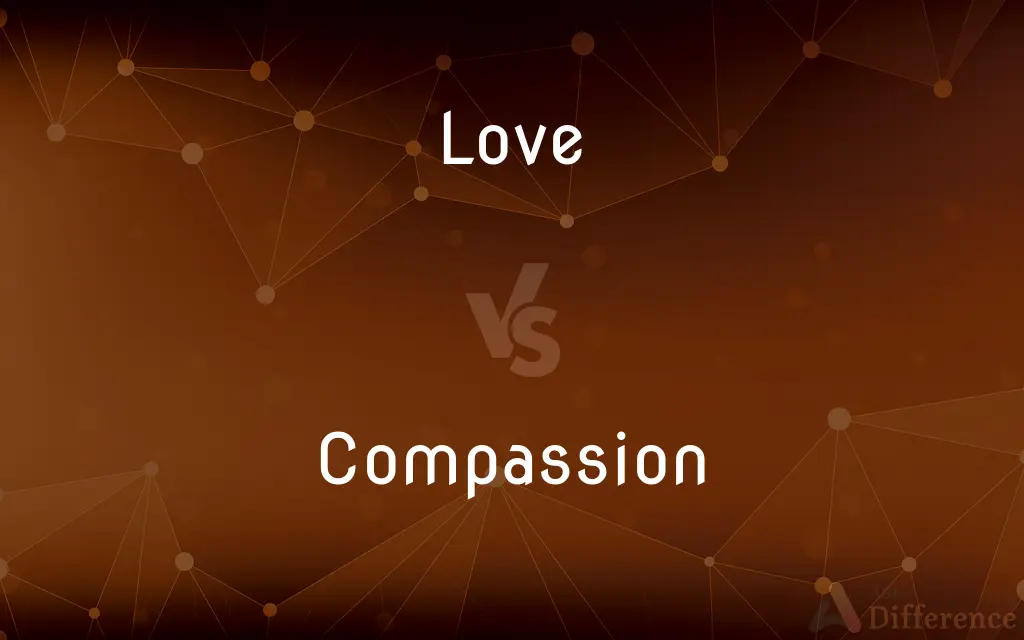Love vs. Compassion — What's the Difference?
By Tayyaba Rehman & Fiza Rafique — Updated on March 12, 2024
Love encompasses deep affection and emotional bonds, while compassion involves empathetic concern and a desire to alleviate suffering.

Difference Between Love and Compassion
Table of Contents
ADVERTISEMENT
Key Differences
Love is a complex emotion characterized by a deep affection towards someone or something, often leading to a strong emotional bond and personal attachment. It can manifest in various forms such as romantic love, familial love, or friendship. On the other hand, compassion is a form of empathy where one not only understands another's suffering but also desires to alleviate it. Compassion extends beyond personal attachment and can be felt for strangers or even all living beings.
While love can be exclusive and often reserved for specific individuals, compassion is inclusive and universal, extending kindness and understanding to all without discrimination. Love involves a deep sense of care and commitment towards the loved ones, often accompanied by a desire for their happiness and well-being. Compassion, however, focuses on recognizing and relieving suffering, regardless of the closeness of the relationship.
Love may include elements of compassion, especially in its desire for the well-being of the loved one, but it also encompasses other dimensions such as passion, intimacy, and commitment. Compassion, in its pure form, does not necessarily involve these elements and can be practiced even in the absence of a close relationship. It is rooted in a principled concern for others' welfare, often motivated by a sense of shared humanity.
The expression of love can vary greatly, ranging from acts of kindness and generosity to verbal affirmations and physical touch, tailored to the preferences and needs of the loved ones. Compassion, while also expressed through acts of kindness, emphasizes understanding, support, and actions aimed at alleviating suffering, often without expecting anything in return.
Love and compassion both play crucial roles in human relationships and society. Love drives personal relationships, fostering connection, and mutual support, while compassion contributes to a more empathetic and caring society, promoting altruistic behavior and social cohesion.
ADVERTISEMENT
Comparison Chart
Nature
Deep affection and attachment
Empathetic concern for suffering
Focus
Emotional bonds and personal happiness
Alleviating suffering and promoting welfare
Scope
Often specific to individuals
Universal and inclusive
Key Elements
Affection, intimacy, commitment
Empathy, kindness, altruism
Expression
Tailored acts of kindness, verbal and physical expressions
Supportive actions, understanding, alleviating suffering
Compare with Definitions
Love
A deep emotional connection with someone or something, characterized by affection and care.
The love between parents and their children is unconditional.
Compassion
The empathetic awareness of others' distress coupled with a desire to alleviate it.
Her compassion for the homeless inspired her to volunteer at the shelter.
Love
Can manifest in different forms, such as romantic love, friendship, and familial love.
The romantic love shared between partners is often celebrated on Valentine's Day.
Compassion
Involves understanding and kindness towards people without needing personal attachment.
He felt compassion for the stranded travelers and offered them a ride.
Love
May include elements of passion, intimacy, and commitment.
Their love was evident in their commitment to support each other in difficult times.
Compassion
Expressed through acts of kindness, understanding, and practical support.
Showing compassion, the nurse took extra time to comfort her anxious patient.
Love
Often expressed through personalized acts of kindness and affection.
He expressed his love through thoughtful gestures and words of encouragement.
Compassion
Can be directed towards anyone, including strangers and even all living beings.
Compassion for all living beings is a central tenet of many spiritual traditions.
Love
Involves a desire for the happiness and well-being of the loved ones.
She showed her love by cooking his favorite meal.
Compassion
Focused on alleviating suffering through supportive actions.
The community's compassion was evident in their efforts to aid flood victims.
Love
Love encompasses a range of strong and positive emotional and mental states, from the most sublime virtue or good habit, the deepest interpersonal affection, to the simplest pleasure. An example of this range of meanings is that the love of a mother differs from the love of a spouse, which differs from the love of food.
Compassion
Compassion motivates people to go out of their way to help the physical, mental, or emotional pains of another and themselves. Compassion is often regarded as having sensitivity, which is an emotional aspect to suffering.
Love
A strong feeling of affection and concern toward another person, as that arising from kinship or close friendship.
Compassion
Literally, suffering with another; a sensation of sorrow excited by the distress or misfortunes of another; pity; commiseration.
Womanly ingenuity set to work by womanly compassion.
Love
A feeling of devotion or adoration toward God or a god.
Compassion
The humane quality of understanding the suffering of others and wanting to do something about it
Love
A feeling of kindness or concern by God or a god toward humans.
Compassion
Sympathetic pity and concern for the sufferings or misfortunes of others
The victims should be treated with compassion
Love
Often Love(Christianity) Charity.
Compassion
Deep awareness of the suffering of another accompanied by the wish to relieve it.
Love
An instance of being in love
Teenage loves can be as fleeting as they are intense.
Compassion
Deep awareness of the suffering of another, coupled with the wish to relieve it.
Love
A person for whom one has strong feelings of affection
She met her new love at the restaurant.
Compassion
(obsolete) To pity.
Love
Used as a term of endearment for such a person.
Compassion
To pity.
Love
An intense emotional attachment to something, as to a pet or treasured object.
Compassion
A deep awareness of and sympathy for another's suffering
Love
An expression of one's affection
Send him my love.
Love
A strong predilection or enthusiasm
A love of language.
Love for the game of golf.
Love
The object of such an enthusiasm
The outdoors is her greatest love.
Love
Love(Mythology) Eros or Cupid.
Love
(Sports) A score of zero, as in tennis.
Love
To feel love for (a person)
We love our parents. I love my friends.
Love
To feel devotion to (God or a god).
Love
To feel or show kindness or concern to (a person). Used of God or a god.
Love
To have an intense emotional attachment to
Loves his house.
Love
To embrace or caress
They were loving each other on the sofa.
Love
To like or desire enthusiastically
Loves swimming.
Love
To thrive on; need
The cactus loves hot, dry air.
Love
(uncountable) A deep caring for the existence of another.
Love
(uncountable) Strong affection.
Love
A profound and caring affection towards someone.
A mother’s love is not easily shaken.
My husband’s love is the most important thing in my life.
Love
Affectionate, benevolent concern or care for other people or beings, and for their well-being.
Love
A feeling of intense attraction towards someone.
I have never been in love as much as I have with you.
Love
A deep or abiding liking for something; an enthusiasm for something.
My love of cricket knows no bounds.
Love
(countable) A person who is the object of romantic feelings; a darling, a sweetheart, a beloved.
Love
A term of friendly address, regardless of feelings.
Hello love, how can I help you?
Love
A thing, activity, etc. which is the object of one's deep liking or enthusiasm.
Love
An instance or episode of being in love; a love affair.
Love
Used as the closing, before the signature, of a letter, especially between good friends or family members, or by the young.
Love
(obsolete) A thin silk material.
Love
A climbing plant, Clematis vitalba.
Love
Zero, no score.
So that’s fifteen-love to Kournikova.
Love
Nothing; no recompense.
Love
To have a strong affection for (someone or something).
I love my spouse.
I love you!
I love that song!
Love
(transitive) To need, thrive on.
Mold loves moist, dark places.
Love
(transitive) To be strongly inclined towards something; an emphatic form of like.
I love walking barefoot on wet grass;
I'd love to join the team;
I love what you've done with your hair
Love
To care deeply about, to be dedicated to (someone or something).
Love
(transitive) To derive delight from a fact or situation.
I love the fact that the coffee shop now offers fat-free chai latte.
Love
A feeling of strong attachment induced by that which delights or commands admiration; preëminent kindness or devotion to another; affection; tenderness; as, the love of brothers and sisters.
Of all the dearest bonds we proveThou countest sons' and mothers' loveMost sacred, most Thine own.
Love
Courtship; - chiefly in the phrase to make love, i. e., to court, to woo, to solicit union in marriage.
Demetrius . . . Made love to Nedar's daughter, Helena,And won her soul.
Love
Due gratitude and reverence to God.
Keep yourselves in the love of God.
Love
The object of affection; - often employed in endearing address; as, he held his love in his arms; his greatest love was reading.
Open the temple gates unto my love.
Love
Cupid, the god of love; sometimes, Venus.
Such was his form as painters, when they showTheir utmost art, on naked Lores bestow.
Therefore do nimble-pinioned doves draw Love.
Love
A thin silk stuff.
Love
A climbing species of Clematis (Clematis Vitalba).
Love
Nothing; no points scored on one side; - used in counting score at tennis, etc.
He won the match by three sets to love.
Love
To have a feeling of love for; to regard with affection or good will; as, to love one's children and friends; to love one's country; to love one's God.
Thou shalt love the Lord thy God with all thy heart, and with all thy soul, and with all thy mind.
Thou shalt love thy neighbor as thy self.
Love
To take delight or pleasure in; to have a strong liking or desire for, or interest in; to be pleased with; to like; as, to love books; to love adventures.
Wit, eloquence, and poetry.Arts which I loved.
Love
To have the feeling of love; to be in love.
Love
A strong positive emotion of regard and affection;
His love for his work
Children need a lot of love
Love
Any object of warm affection or devotion;
The theater was her first love
He has a passion for cock fighting
Love
A beloved person; used as terms of endearment
Love
A score of zero in tennis or squash;
It was 40 love
Love
Have a great affection or liking for;
I love French food
She loves her boss and works hard for him
Love
Get pleasure from;
I love cooking
Love
Be enamored or in love with;
She loves her husband deeply
Common Curiosities
Can love exist without compassion?
While love often includes elements of compassion, especially in its concern for others' well-being, it can exist in various forms that might not always prioritize alleviating suffering.
How does compassion differ from love?
Compassion centers on empathetic concern and actions to alleviate suffering, without necessarily involving personal attachment.
What is the essence of love?
Love is characterized by deep affection, emotional bonds, and a commitment to someone or something's well-being.
Is compassion always part of love?
Compassion can be a component of love, particularly in its focus on others' well-being, but love also encompasses other dimensions like intimacy and passion.
Why is compassion important in society?
Compassion fosters empathy, altruism, and social cohesion, contributing to a more caring and supportive community.
How is love expressed differently from compassion?
Love is expressed through personalized acts of kindness and affection, while compassion is shown through understanding and actions aimed at relieving suffering.
How can one cultivate more compassion?
Compassion can be cultivated through practices like mindfulness, empathy exercises, and acts of kindness.
How do love and compassion benefit personal relationships?
Love strengthens personal bonds and mutual support, while compassion enhances empathy and understanding within relationships.
Are there different types of love?
Yes, love can take many forms, including romantic love, platonic love, familial love, and self-love, each with its characteristics and expressions.
Can compassion lead to love?
Compassion can sometimes lead to deeper emotional connections and love, but it does not inherently involve the personal attachment or commitment characteristic of love.
Does society value love more than compassion?
Societal values can vary, but both love and compassion are highly valued for their contributions to personal fulfillment and social welfare.
Can you feel compassion for someone you don't love?
Yes, compassion can be felt for anyone, including strangers, based on a principled concern for their suffering.
Can the lack of compassion affect relationships?
Yes, a lack of compassion can lead to misunderstandings, conflicts, and weakened emotional connections in relationships.
Is compassion a learned behavior or innate?
Compassion is believed to be a combination of innate tendencies and learned behaviors, influenced by upbringing and cultural factors.
How do love and compassion intersect in caregiving roles?
In caregiving roles, love can motivate personal commitment and care, while compassion drives understanding and the alleviation of suffering.
Share Your Discovery

Previous Comparison
Briefs vs. Drawers
Next Comparison
Respect vs. DecencyAuthor Spotlight
Written by
Tayyaba RehmanTayyaba Rehman is a distinguished writer, currently serving as a primary contributor to askdifference.com. As a researcher in semantics and etymology, Tayyaba's passion for the complexity of languages and their distinctions has found a perfect home on the platform. Tayyaba delves into the intricacies of language, distinguishing between commonly confused words and phrases, thereby providing clarity for readers worldwide.
Co-written by
Fiza RafiqueFiza Rafique is a skilled content writer at AskDifference.com, where she meticulously refines and enhances written pieces. Drawing from her vast editorial expertise, Fiza ensures clarity, accuracy, and precision in every article. Passionate about language, she continually seeks to elevate the quality of content for readers worldwide.














































